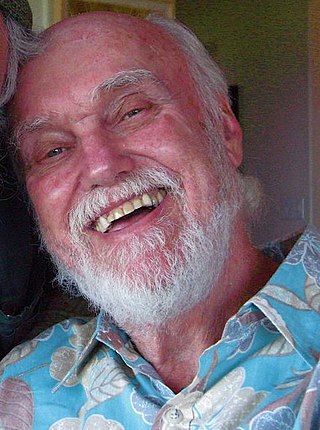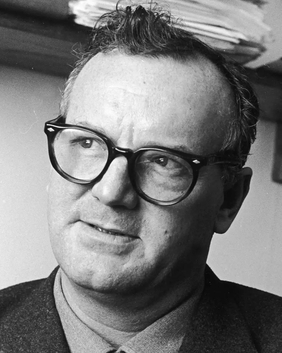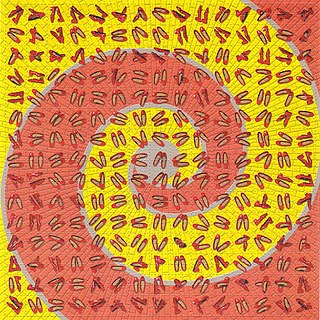Related Research Articles

Timothy Francis Leary was an American psychologist and author known for his strong advocacy of psychedelic drugs. Evaluations of Leary are polarized, ranging from bold oracle to publicity hound. According to poet Allen Ginsberg, he was "a hero of American consciousness", and writer Tom Robbins called him a "brave neuronaut". During the 1960s and 1970s, Leary was arrested 36 times. President Richard Nixon described him as "the most dangerous man in America".

Psychedelia usually refers to a style or aesthetic that is resembled in the psychedelic subculture of the 1960s and the psychedelic experience produced by certain psychoactive substances. This includes psychedelic art, psychedelic music and style of dress during that era. This was primarily generated by people who used psychedelic drugs such as LSD, mescaline and psilocybin and also non-users who were participants and aficionados of this subculture. Psychedelic art and music typically recreate or reflect the experience of altered consciousness. Psychedelic art uses highly distorted, surreal visuals, bright colors and full spectrums and animation to evoke, convey, or enhance the psychedelic experience. Psychedelic music uses distorted electric guitar, Indian music elements such as the sitar, tabla, electronic effects, sound effects and reverb, and elaborate studio effects, such as playing tapes backwards or panning the music from one side to another.

A hippie, also spelled hippy, especially in British English, is someone associated with the counterculture of the 1960s, originally a youth movement that began in the United States during or around 1964 and spread to different countries around the world. The word hippie came from hipster and was used to describe beatniks who moved into New York City's Greenwich Village, San Francisco's Haight-Ashbury district, and Chicago's Old Town community. The term hippie was used in print by San Francisco writer Michael Fallon, helping popularize use of the term in the media, although the tag was seen elsewhere earlier.

Ram Dass, also known as Baba Ram Dass, was an American spiritual teacher, guru of modern yoga, psychologist, and writer. His best-selling 1971 book Be Here Now, which has been described by multiple reviewers as "seminal", helped popularize Eastern spirituality and yoga in the West. He authored or co-authored twelve more books on spirituality over the next four decades, including Grist for the Mill (1977), How Can I Help? (1985), and Polishing the Mirror (2013).
Ronin Publishing, Inc. is a small press in Berkeley, California, founded in 1983 and incorporated in 1985, which publishes books as tools for personal development, visionary alternatives, and expanded consciousness. The company's tagline is "Life Skills with Attitude!" In a 1996 Publishers Weekly profile, the company describes itself as a "strong player in the hemp and psychedelia market" that has little competition from major publishers.
"The Revolution Will Not Be Televised" is a satirical poem and song by Gil Scott-Heron. Scott-Heron first recorded it for his 1970 album Small Talk at 125th and Lenox, on which he recited the lyrics, accompanied by congas and bongo drums. A re-recorded version, with a full band, was the B-side to Scott-Heron's first single, "Home Is Where the Hatred Is", from his album Pieces of a Man (1971). It was also included on his compilation album, The Revolution Will Not Be Televised (1974). All these releases were issued on the Flying Dutchman Productions record label.

Charles Wright Mills was an American sociologist, and a professor of sociology at Columbia University from 1946 until his death in 1962. Mills published widely in both popular and intellectual journals, and is remembered for several books, such as The Power Elite, White Collar: The American Middle Classes, and The Sociological Imagination. Mills was concerned with the responsibilities of intellectuals in post–World War II society, and he advocated public and political engagement over disinterested observation. One of Mills's biographers, Daniel Geary, writes that Mills's writings had a "particularly significant impact on New Left social movements of the 1960s era." It was Mills who popularized the term New Left in the U.S. in a 1960 open letter, "Letter to the New Left".

The psychedelic drug lysergic acid diethylamide (LSD) was first synthesized on November 16, 1938, by the Swiss chemist Albert Hofmann in the Sandoz laboratories in Basel, Switzerland. It was not until five years later on April 19, 1943, that the psychedelic properties were found.

Psychedelic art is art, graphics or visual displays related to or inspired by psychedelic experiences and hallucinations known to follow the ingestion of psychedelic drugs such as LSD, psilocybin, and DMT. The word "psychedelic" means "mind manifesting". By that definition, all artistic efforts to depict the inner world of the psyche may be considered "psychedelic".
The Psychedelic era was the time of social, musical and artistic change influenced by psychedelic drugs, occurring from the mid-1960s to mid-1970s. The era was defined by the proliferation of LSD and its following influence in the development of psychedelic music and psychedelic film in the Western world.

The Harvard Psilocybin Project was a series of experiments aimed at exploring the effects of psilocybin intake on the human mind conducted by Timothy Leary and Richard Alpert. The founding board of the project consisted of Leary, Aldous Huxley, David McClelland, Frank Barron, Ralph Metzner, and two graduate students who were working on a project with mescaline.
The Brotherhood of Eternal Love was an organization of drug users and distributors that operated from the mid-1960s through the late 1970s in Orange County, California. They were dubbed the Hippie Mafia by the police. They produced and distributed drugs in hopes of starting a "psychedelic revolution" in the United States.

Bruce Jay Ehrlich, better known by his pen name Bruce Eisner, was an American writer, psychologist, and counterculture spokesman mostly known for his book Ecstasy: The MDMA Story.
Ego death is a "complete loss of subjective self-identity". The term is used in various intertwined contexts, with related meanings. Jungian psychology uses the synonymous term psychic death, referring to a fundamental transformation of the psyche. In death and rebirth mythology, ego death is a phase of self-surrender and transition, as described by Joseph Campbell in his research on the mythology of the Hero's Journey. It is a recurrent theme in world mythology and is also used as a metaphor in some strands of contemporary western thinking.

The counterculture of the 1960s was an anti-establishment cultural phenomenon and political movement that developed in the Western world during the mid-20th century. It began in the early 1960s, and continued through the early 1970s. It is often synonymous with cultural liberalism and with the various social changes of the decade. The effects of the movement have been ongoing to the present day. The aggregate movement gained momentum as the civil rights movement in the United States had made significant progress, such as the Voting Rights Act of 1965, and with the intensification of the Vietnam War that same year, it became revolutionary to some. As the movement progressed, widespread social tensions also developed concerning other issues, and tended to flow along generational lines regarding respect for the individual, human sexuality, women's rights, traditional modes of authority, rights of people of color, end of racial segregation, experimentation with psychoactive drugs, and differing interpretations of the American Dream. Many key movements related to these issues were born or advanced within the counterculture of the 1960s.

Cyberdelic was the fusion of cyberculture and the psychedelic subculture that formed a new counterculture in the 1980s and 1990s.

League for Spiritual Discovery (LSD) was a spiritual organization inspired by the works of Timothy Leary, and strove for legal use of lysergic acid diethylamide (LSD) for the purpose of meditation, insight, and spiritual understanding. It was in existence during the mid-to-late 1960s, and eventually closed by Leary. The New York Center for the League of Spiritual Discovery, in existence for around a year, was co-founded by Timothy Leary and Nina Graboi in 1966. The center was the first LSD-based meditation center in Manhattan.
"Turn on, tune in, drop out" is a counterculture-era phrase popularized by Timothy Leary in 1966. In 1967, Leary spoke at the Human Be-In, a gathering of 30,000 hippies in Golden Gate Park in San Francisco and phrased the famous words, "Turn on, tune in, drop out". It was also the title of his spoken word album recorded in 1966. On this lengthy album, Leary can be heard speaking in a monotone soft voice on his views about the world and humanity, describing nature, Indian symbols, "the meaning of inner life", the LSD experience, peace, and many other issues.

The Zihuatanejo Project was a psychedelic training center and intentional community created during the beginning of the counterculture of the 1960s by Timothy Leary and Richard Alpert under the umbrella of their nonprofit group, the International Federation for Internal Freedom (IFIF). The community was located in Zihuatanejo, Guerrero, Mexico, and took up residence at the Hotel Catalina in the summers of 1962 and 1963.
The following is a list of works by Timothy Leary. The majority of Leary's works were put into the public domain by his estate in 2009.
References
- ↑ Beverly Potter; Mark Estren (2012). Question Authority; Think for Yourself. Ronin Publishing. p. 22. ISBN 978-1579511623 . Retrieved May 17, 2014.
- ↑ "Answer: Origin of the Phrase 'Question Authority' | Radical Reference".
- ↑ David Farber (2004). The Sixties Chronicle. Legacy Publishing. p. 287. ISBN 141271009X.
- ↑ Donaldson, Robert H. (2015). Modern America: A Documentary History of the Nation Since 1945. Routledge. p. 128. ISBN 978-0765615374.
- ↑ David Farber (2004). The Sixties Chronicle. Legacy Publishing. p. 448. ISBN 141271009X.
- ↑ Beverly Potter; Mark Estren (2012). Question Authority; Think for Yourself. Ronin Publishing. p. 23. ISBN 978-1579511623 . Retrieved May 17, 2014.
- 1 2 Mills, C. Wright (April 19, 1956). The Power Elite . Oxford University Press. p. 317.